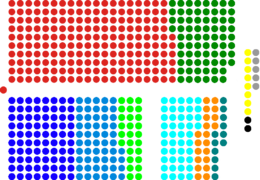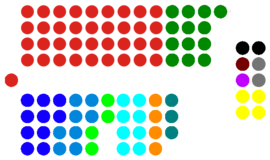Parliament of the United Colonies
| This page is a work in progress by its author(s) and should not be considered final. |
| Colonial Parliament | |
|---|---|
| Type | |
| Type | Bicameral |
| Houses |
Colonial Senate Colonial Assembly |
| Term limits | 10 Years |
| History | |
| Founded | June 1619, 399 years ago |
| Preceded by | Assembly of the Aldian Cooperative |
| New session started | November 10th, 2010 |
| Leadership | |
| Speaker of the Assembly | Forte Attley, Labor |
| Speaker of the Senate | Laars Fjordrekson, Labor |
| Structure | |
 | |
| Colonial Assembly political groups |
520 Seats |
 | |
| Colonial Senate political groups |
97 Seats |
| Elections | |
| Colonial Assembly voting system | Instant-Runoff Voting |
| Colonial Senate voting system | Single Transferable Vote |
| Colonial Assembly last election | 2010 Legislative Election |
| Colonial Senate last election | 2010 Legislative Election |
| Colonial Assembly next election | 2020 Legislative Election |
| Colonial Senate next election | 2020 Legislative Election |
| Constitution | |
| Declaration of the United Colonies | |
The Colonial Parliament of the United Colonies, commonly known as the Colonial Parliament is the supreme legislative body within the United Colonies and its extra-solar territories. All other political bodies within the United Colonies, with the exception of the executive and military establishment, ultimately answer to the Colonial Parliament. Its head is the President of the United Colonies, its seat is at Domain Interchange at Parliament Square within Jindabyne, the capital city of the United Colonies. The Colonial Parliament is a bicameral parliament and is comprised of two houses: the Colonial Assembly and the Colonial Senate. The Colonial Assembly is the lower house and proposes legislation to the upper house to be approved and ratified and monitors the executive body of the nation. The Colonial Senate is the upper house and is vested with significant powers as it has the capacity to either pass or block legislation put forward by the President and the Colonial Assembly.
Membership within the Colonial Assembly & Senate represents the twenty established colonies, all extra-solar territories and space habitats governed by the Government of the United Colonies. The Colonial Senate consists of 97 members: four senators from each colony, ten from Aldia and seven from the Colonial Administration Authority (CAA). Meanwhile the Colonial Assembly consists of 520 seats: each colony having been assigned eighteen seats, one hundred and thirty seats for Aldia and thirty seats for the CAA. Politics within the Colonial Assembly has generally been dominated by three major parties: the Colonial Labor Party (CLP/Labor), the United Greens (Greens) and the Coalition, the latter being an alliance of center-right parties within the United Colonies. Elections take place once every ten years which allows governments to adopt a more long-term approach towards strategic planning & policy making. Labor has been in government since the 1979 General Elections, having removed the Coalition from power after more than fifty years in power.
As noted, the Colonial Senate is vested with significantly higher powers as it possess the ability to block passage of a bill proposed by either the lower house or President. In the event that a bill that has been passed by the Assembly is been blocked twice by the Senate, then the Speaker of the Assembly may advise the President of the United Colonies for a double dissolution. This act will dissolve one or both the Colonial Assembly & Senate, bringing forward a snap election. If after a double dissolution the same bill still cannot be approved by the Senate then the Political & Morale Commander of the United Colonies will convene for a joint sitting of both houses where the bill, or bills, and any of its amendments will be considered by both houses. As its name suggests a joint siting is when members of both houses of the Colonial Parliament sit together as one legislative body to consider and/or deliberate a bill or bills. A joint sitting is a very rare occasion and has only occurred twice, the first in 1822 in the events that led up to the Unsung War, and in 1979 when the Coalition government of the time requested for a double dissolution after it failed to pass an appropriation bill in the Senate.
